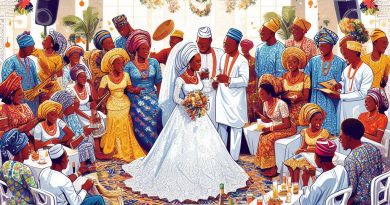The Stigma of Seeking Marriage Counseling in Nigeria: Breaking Myths
Last Updated on January 28, 2024
Introduction
Marriage counseling in Nigeria carries a heavy stigma, which inhibits couples from seeking help.
We must address and break the stigma surrounding seeking marriage counseling in Nigeria.
Unveiling the Stigma: A Brief Overview
In the heart of Nigeria’s rich tapestry lies a hushed secret: the stigma of seeking marriage counseling. This blog unveils the myths that shroud this crucial aspect of relationship wellness.
Significance of the Topic:
- Exposing Truths: Unraveling misconceptions surrounding marriage counseling.
- Nurturing Bonds: Enhancing understanding of relationship dynamics for a healthier society.
The Veil of Stigma:
- Tradition vs. Reality: A clash between traditional values and modern relationship needs.
- Silence as a Barrier: The deafening silence that deters couples from seeking professional help.
- Cultural Expectations: How societal norms dictate the perception of seeking external guidance.
- Emotional Toll: The toll it takes on individuals and couples harboring unaddressed issues.
- Relationship Erosion: Slow erosion of the marital foundation due to unattended challenges.
In Nigeria, seeking marriage counseling is often viewed as a sign of weakness, a whisper of discord in the sacred union.
Unmasking these misconceptions is crucial for fostering healthy relationships and eradicating the stigma that inhibits couples from seeking the help they need.
Stay tuned as we delve deeper into the roots of this stigma, unraveling the layers one myth at a time.
The cultural perspective on marriage in Nigeria
Discuss Nigerian society’s view on marriage and its importance
- Nigerian society highly values marriage, viewing it as a significant milestone.
- People view marriage as a means of establishing and fortifying family bonds within Nigerian society.
- It is also essential for procreation and continuation of the family lineage.
- The institution of marriage is deeply rooted in cultural and religious traditions.
- Nigerian society places a great emphasis on marriage as a symbol of social status and success.
Highlight the expectations and pressures placed on married couples
- Married couples in Nigeria are expected to maintain a harmonious and fulfilling relationship.
- there is a pressure to conform to societal norms and fulfill traditional gender roles.
- Husbands are expected to be the providers and protectors of the family.
- Wives are expected to be submissive, obedient, and take care of household chores.
- The pressure to have children and create a large family is also significant.
- Couples are expected to navigate through challenges and disagreements in a private manner.
Explain the reluctance to seek outside help due to perceived shame or failure
- Seeking marriage counseling in Nigeria is often seen as a sign of weakness or failure.
- There is a prevalent stigma attached to admitting problems within the marital relationship.
- Many Nigerian couples fear being judged by their family, friends, and society at large.
- The fear of damaging their reputation and social standing prevents them from seeking help.
- Seeking outside help is often perceived as a last resort, after all other attempts to resolve issues have failed.
- Couples may also fear the potential gossip and rumors that could circulate if they seek counseling.
In short, the cultural perspective on marriage in Nigeria highlights the significance and expectations placed on married couples.
Nigerian society views marriage as an important institution for maintaining family ties, continuing the lineage, and as a symbol of social status.
However, the pressure to conform to societal expectations and the fear of shame or failure often discourages couples from seeking outside help through counseling.
Address the stigma attached to seeking marriage counseling in Nigeria, ensuring couples access the support needed for a healthy relationship.
Read: The Role of Witnesses in Nigerian Marriage Registration
Understanding the stigma attached to marriage counseling
Explore the societal beliefs and myths surrounding marriage counseling:
- Myth 1: Only couples in a troubled marriage seek counseling.
- Myth 2: Seeking counseling implies weakness or incompetence.
- Myth 3: Counseling is a Western influence and goes against traditional values.
Discuss how these myths contribute to the stigma
Marriage is a sacred institution that plays a significant role in Nigerian culture.
A deeply ingrained stigma hinders many couples from seeking the help they need when it comes to marriage counseling.
Let’s explore the origin of this stigma and the myths that contribute to it.
Myth 1: Only couples in a troubled marriage seek counseling.
One common misconception is that marriage counseling is only for couples on the brink of divorce.
This myth prevents couples from seeking help early on, when issues can still be resolved effectively.
In reality, counseling provides tools for communication, conflict resolution, and strengthening the emotional bond.
Myth 2: Seeking counseling implies weakness or incompetence.
Society deems admitting help needs as weakness, fearing judgment or labels of incompetence when seeking professional guidance in relationships.
However, it takes courage to recognize and address issues within a marriage, and counseling can empower couples to build a healthier relationship.
Myth 3: Counseling is a Western influence and goes against traditional values.
Many Nigerians see marriage counseling as foreign and against tradition, fearing it undermines the sanctity of marriage.
However, counseling equips couples with skills to address challenges within their cultural context.
These misconceptions contribute to the stigma around marriage counseling in Nigeria.
Couples avoid seeking help, fearing judgment and societal backlash.
Consequently, many marriages struggle to overcome issues that could have been resolved with professional assistance.
The stigma reinforces the idea that seeking help signifies failure. This notion hinders personal growth in relationships and perpetuates unhealthy patterns.
By challenging these myths, society can enable couples to access tools and resources for a fulfilling marriage.
To break the stigma, educating the public about marriage counseling realities is crucial.
Highlighting success stories and emphasizing early intervention’s importance can change societal beliefs.
Offering accessible and affordable counseling services, promoting open mental health discussions, and fostering an accepting environment are essential.
Nigerians must understand that seeking marriage counseling doesn’t imply weakness but commitment to a healthy and fulfilling marriage.
By challenging myths and promoting counseling benefits, we can create a society that embraces seeking help and supports couples.
Read: Biblical Anniversary Wishes Perfect for Your Nigerian Friend

Learn More: The Evolution of Marriage Traditions in Nigeria
Breaking the myths: The need for marriage counseling in Nigeria
Highlight the benefits of marriage counseling
- Marriage counseling enhances communication and conflict resolution skills.
- It helps in addressing unresolved issues and resentments within the relationship.
- Marriage counseling strengthens emotional intimacy and connection between spouses.
Share success stories and testimonials from couples who have sought counseling
Marriage counseling in Nigeria has proven to be beneficial for numerous couples who have actively engaged in the process.
Here are some success stories and testimonials that highlight the positive outcomes of seeking professional help:
1. Case Study: Mr. and Mrs. Johnson
Mr. and Mrs. Johnson had been married for ten years and were facing continuous conflicts that seemed impossible to resolve.
They decided to seek marriage counseling as a last resort.
Through counseling, they learned effective communication techniques, enabling them to express their concerns without anger or blame.
They also discovered that their conflicts stemmed from unresolved issues and past resentments.
The counseling sessions allowed them to tackle these underlying problems and work towards forgiveness and healing.
Today, their relationship has transformed into a more loving and supportive one.
2. Testimonial from Mrs. Olawale
“My husband and I had been drifting apart for years, and we hardly communicated.
We decided to give marriage counseling a try, and it was the best decision we ever made.
The counselor helped us rebuild our communication channels and taught us how to actively listen to each other.
We discovered the root causes of our issues and learned effective conflict resolution strategies.
Our emotional connection has grown stronger, and we feel more intimate than ever before.”
3. Testimonial from Mr. and Mrs. Ahmed
“We were on the verge of divorce when we decided to attend marriage counseling.
It was a tough journey, but with the help of our counselor, we were able to address our deep-seated resentments and unmet emotional needs.
The counseling sessions provided a safe space for us to express our disappointments and frustrations.
As a result, we gained a better understanding of each other’s perspectives.
Today, our bond is stronger, and we have renewed hope for our future together.”
These success stories and testimonials demonstrate the transformative power of marriage counseling in Nigeria.
They prove that seeking professional help can lead to positive changes in communication, conflict resolution, and emotional intimacy within a relationship.
In fact, breaking the stigma surrounding marriage counseling in Nigeria is crucial.
Highlight the benefits, share success stories, and encourage more couples to seek help, enhancing their marital relationships.
Seeking marriage counseling is not a sign of weakness but rather a proactive step towards building a stronger and healthier partnership.
Let us embrace the power of counseling and work towards breaking the myths surrounding it.
Read: Marriage in Paul’s Letters: A Biblical Perspective
Overcoming the stigma: Steps towards destigmatizing marriage counseling
Encouraging open discussions about marriage challenges within communities
- Initiate community forums where individuals can openly talk about their marriage issues without fear of judgment.
- Foster a culture that promotes healthy communication and sharing of personal experiences.
- Educate community members on the benefits of addressing marriage challenges through counseling.
- Empower couples to seek help by emphasizing that seeking counseling is a sign of strength, not weakness.
Promoting awareness and education about the effectiveness of counseling
- Utilize various forms of media to educate the public on the positive outcomes of marriage counseling.
- Share success stories of couples who have benefited from counseling to inspire others.
- Collaborate with local organizations to organize workshops and seminars on the importance of counseling.
- Provide statistics and research findings that highlight the effectiveness of counseling in improving marriages.
Advocating for professional counselors to challenge the myths
- Encourage counselors to actively dispel myths and misconceptions surrounding marriage counseling.
- Provide training and resources to equip counselors with effective strategies to debunk common stereotypes.
- Collaborate with counseling associations to develop campaigns aimed at changing public perceptions.
- Highlight the qualifications and expertise of counselors to establish trust and credibility.
Offering support systems and resources for couples considering counseling
- Establish helplines or online platforms where couples can seek guidance and information about counseling.
- Create support groups where couples can share their experiences and offer mutual support.
- Develop accessible and affordable counseling services to remove financial barriers.
- Partner with religious institutions to integrate counseling services into premarital and marital programs.
By implementing these strategies, Nigeria can make significant progress in destigmatizing marriage counseling.
Read: Genesis to Revelations: Marriage Verses in the Bible
Conclusion
A recap of the key points discussed in the blog post
- The stigma surrounding marriage counseling in Nigeria is based on myths and misconceptions.
- The fear of judgment and social pressure prevents many couples from seeking professional help.
- The importance of educating society about the benefits of marriage counseling and dispelling myths.
- The negative effects of the stigma on individuals and the overall well-being of marriages.
- The need for open-mindedness and understanding when it comes to seeking help for relationship issues.
- The positive impact of seeking marriage counseling on communication, conflict resolution, and overall relationship satisfaction.
It is essential to break the stigma and seek help when needed
Marriage counseling plays a vital role in strengthening relationships and promoting mutual understanding.
By challenging the stigma, we can create a society that values healthy relationships and encourages seeking help when needed.
Call to action
Let us challenge the stigma surrounding marriage counseling and support couples in their decision to seek professional help.
By offering our understanding, empathy, and encouragement, we can create a safe space for individuals to address their relationship issues without fear of judgment.


